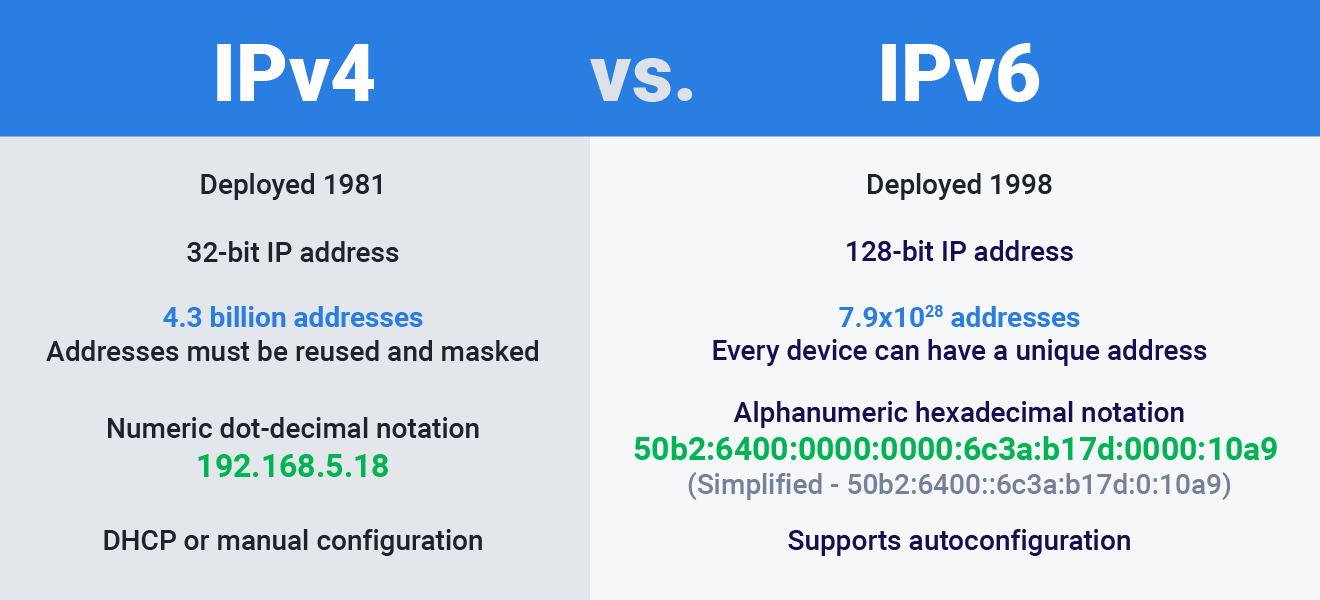The internet runs on rules called protocols, with IPv4 and IPv6 being the two main types. IPv4 has been around for decades, while IPv6 is the newer version, available to support the growing number of connected devices. As more people stream videos, play games online, and work remotely, speed has become more critical than ever. For both users and businesses, faster connections can mean better experiences and smoother operations. This raises an important question: Does IPv6 offer better speed than IPv4? In this article, we will explore whether is IPv6 faster than IPv4 during browsing and streaming process
Is IPv6 Faster Than IPv4: Overview
IPv4, introduced in the early 1980s, is the foundation of today’s internet. It uses a 32-bit address space, allowing a maximum of 4.3 billion addresses. Although it is old, IPv4 is still extensively suitable in the world’s networks. It is easy to deal with, and its format is simple, making it one of the most popular. Thus, best IPV4 broker has some restrictions in the ability to provide addresses; therefore, there is a need to have a more scalable system like IPv6.
IPv6 has been suitable to deal with the scarcity of IPv4 addresses. It implements a 128-bit addressing scheme, which provides nearly maximum addresses. This is making it suitable for the increasing number of devices on the internet. Promising features include built-in security and auto-configuration. This supports the smooth and safe running of the networks, which are also part of the IPv6. With the spread of digital requirements, the future guarantees online communication will give significance to IPv6 when it comes to equipping the internet to increase in dimensions.
Significant Reasons Why IPV6 is Faster Than IPV4
A. No NAT Translation
As IPv4 relies on Network Address Translation (NAT), additional delays are created each time data is transferred between devices. This is because the router will oversee translating the private IP addresses into their public ones. IPv6 eliminates this necessity. In the direct end-to-end method, information passes between devices more freely, causing a lower latency and creating a faster reputation for online activities.
B. Optimized Routing
In most cases, Internet Service Providers (ISPs) have a better way of dealing with IPv6 traffic instead of considering to purchase IPV4 addresses. This is partly because new peering arrangements are established to prefer IPv6 routes. Consequently, information may travel in shorter routes over the web. The minimal hops make this quicker delivery, and load times are better, which makes the connection faster.
C. Protocol Simplification
IPv6 is developed with efficiency in the new age. Its fancy headers and its simplified design ensure that the routers can process packets with ease. This means reduced traffic on networking devices and faster passing of data. Hence, the low overhead accelerates the process of communication on the web. Well, this is useful to an application relying on a timely response, such as video calls or games.
Browsing vs Streaming: Performance Breakdown
Browsing
Before you are buying IPV4 space, it is important to learn about its browsing breakdown. IPv6 is faster as far as web browsing is concerned, mainly on sites that are fully supported. DNS resolution helps the pages load faster. Users have reported that it performs better on big platforms such as Google and Facebook. IPv6 will also alleviate network congestion, which will enhance the speed of response by a webpage.
IPv6 is a better all-around experience when combined with new hardware and current, updated software. If your internet provider has full IPv6 support, you are bound to enjoy faster and reliable browsing in your daily surfing experiences. It is one slight change that can produce a big difference.
Streaming
IPv6 streaming can also be smoother if your ISP supports it completely. Scores of users report less interference and quicker boot-up when there is IPv6. The videos load more regularly since buffering is dropped when the content server also accepts IPv6.
The IPv6 routes in some areas are simpler to take, and that is why a connection is stable. This support is, however, device-specific, with some smart TVs running on IPv4. To achieve the most effective streaming experience, a versatile IPv6 network and capable devices promote quality and dependable streaming services in a domestic setting.
FAQs: Common Questions People Often Ask
1. Is IPv6 always faster than IPv4 for all types of internet usage?
Not always! The overall performance of the technology depends on your Internet Service Provider (ISP), device and whether the websites and streaming sites you will be using are fully compliant with IPv6.
2. Should I switch to IPv6 to improve the quality of streaming on sites?
The device that handles IPv6 effectively has a faster load time and experiences less buffering. But when your IPv4 connection is NAT or congestion-bottlenecked, then improvements are typically more significant.
3. Do I have to replace hardware or routers to work with IPv6?
The latest devices and routers mostly have IPv6. It is necessary to enable it in the settings of your router, though, and to have your ISP support IPv6.
4. Why hasn’t IPv6 fully replaced IPv4 yet?
The use of IPv6 is gradually being implemented, but at a slow pace because of old systems, compatibility problems in devices and the profitability of IPv4 addresses.
Still Holding Unused IPv4 Addresses? Let’s Turn Them into Profit!
At IPV4 TradeHub, we help you with leasing or selling your IPv4 address at top market prices. As the use of IPv6 is progressively increasing, there cannot be a more intelligent moment to monetize your IPv4 addresses when the purchasing tastes are still in its favor. We provide a secure system where buyers are verified and the whole process is transparent in all directions. Stop and leave your IPs unused, convert them to cash by trading through IPV4 TradeHub today!
